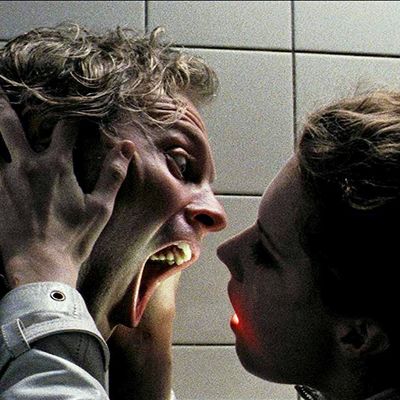
The shot that’s held for longer than you expect … or want … or need: It makes you say to yourself, “Cut, already. Cut. Please cut.” But still it goes on — you have no agency here — although there’s nothing much happening onscreen. So, you slow your breathing and try to stand outside time, as in meditation, although the mantra you repeat is, I’msobored I’msobored I’msobored. Finally, a new shot arrives, but by that point the filmmaker has achieved his or her aim. You feel trapped, helpless, boneless. Maybe a bit hypnotized. Not a bad state in which to watch a surreal horror movie like Tilman Singer’s low-budget, shot-on-16-millimeter Luz.
It’s German but informed by the films of Romania, Russia, and Japan — or anywhere they like to make you wait for plots to unfold. That long (wide), long (lengthy) opening shot is of a young, punkish woman (Luana Velis) half-walking, half-falling into a blandly institutional building where a guard-receptionist at a desk watches impassively. She weaves toward the candy machine, appears to study its contents, and then turns back to the guard. “Is this how you want to live your life?” she asks, with a snarl. He does not respond. In the next shot, a man with sharp cheekbones (Jan Bluthardt) nurses a martini in a bar while a sultry woman, Nora (Julia Reidler), buys him more drinks, plies him with pills and white powders, and tells him a story about her friend Luz, who once got thrown out of a boarding school in Chile. Eventually, the man (who turns out to be a psychiatrist named Rossini) and Nora go to the blandly institutional building, which turns out to be a (nearly empty) police station, to meet Luz, who turns out to be the punkish woman from the first frame, currently working in Germany as a taxi driver. A balding fellow sets up chairs in a sort of makeshift theater with a sound booth. Some official-looking people come in along with Luz, Rossini, and Nora. A blasphemous variation on the Lord’s Prayer is repeated, “Thy will be done in the crotch of an old grandpa … Fuck the Son of Mary …”
“Do you know what’s going on?” my daughter asked, and I said I did, but that was because I’d read a synopsis on IMDb: “Nora is possessed by a demonic entity, longing for the woman it loves — Luz … When called to the police station, the … doctor puts Luz in a state of hypnosis, supervised by his colleagues … Luz recalls the events predating her arrival at the police station.” The demon appears to pass from Nora to Rossini, who is soon wreaking havoc with those chairs, and there are flashbacks to the school in Chile when Luz told another student that she (the girl) was pregnant and the girl freaked out. Luz sings a song and, suddenly, the makeshift theater is full of mist. The doctor, Luz, and the others move in and out of it, attacking and defending.
If Luz had been a play, I’d probably have walked out halfway through, but as a film I found it eerie enough to stay rooted. The annoying, arty style came to seem predatory, as if the demon had seeped into the 16mm film and that haze was from burning celluloid. Composer Simon Waskow’s blips and thumps insinuate themselves into your nervous system. Singer had little money and makes the low budget an asset. You know how hard it would be for Luz to escape the demon, because where would she go? The movie has so few locations.
“I have no idea what just happened,” said my daughter, but she’d had the option of leaving and didn’t. I don’t mean to damn Luz with faint praise: It’s an achievement to grip an audience that has little idea what’s going on.


